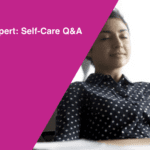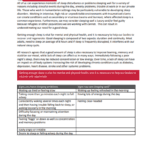Previous Switchboard resources have discussed steps that supervisors and organizations can take to support their staff. There are also things we can do to care for ourselves. Protecting ourselves from overwhelming stress is similar to staying healthy in general: the familiar advice to eat right, exercise, and maintain good sleep patterns is important to follow. But resilience from stress is also reliant on nurturing our relationships, work life and hobbies, material safety, and values. This blog post offers some tips to help you do this.
Mind-Body Connection
In the U.S., we often separate our brains from our bodies when we talk about health. “Mind-body dualism” refers to the concept that mind and body are two separate entities. But this is a false separation: ongoing stress can indeed make us physically ill. This happens because stress increases our blood pressure and heart rate. It impacts our digestion. It tightens our muscles. It douses our brains and bloodstreams in hormones, such as cortisol. Our nervous system is how our brain and spinal cord connect and communicate with various parts of the body. These reactions are useful to keep us safe during short periods of intense stress. But when they are continuous and prolonged, these reactions make us unwell.
Five Pillars of Identity
German Psychologist Hilarion Petzold conceptualized identity into five pillars: Mind and Body; Relationships; Work and Hobbies; Material Safety; and Values. As depicted in the image below, the loss of one pillar can cause our overall identity to be eroded. Often, people working with refugees and immigrants may find that one or two pillars are fully activated, usually the Work pillar and the Values pillar. But despite the amount of attention we place on our work, what we do for a living represents only a small portion of who we are.

Body & Mind
This pillar includes our physical and emotional strength and flexibility. The healthier we are, the more capable we are of remaining healthy under pressure. For example, I was recently talking to a new client. She was tearful throughout the conversation as she told me about the challenges she was experiencing. I asked her about her eating habits, and she was surprised at the question. But as she answered, she realized that she doesn’t normally eat lunch and often does not have time to make dinner. She is also not really a breakfast person, so she is not eating much overall. When I saw her next, she noted that she had not been crying as often, and that she had found a way to add in lunch and dinner most days. Our brains need food to be able to think clearly, and this client’s eating habits were exacerbating her stress. Other health habits that fall under this pillar include exercise, meditation, yoga, sleep hygiene, and mindful breathing.
Relationships
An older client was recently telling me how much she felt like she had aged during the height of the pandemic. She barely saw anyone until she was vaccinated. Being with family and friends again, she said, had brought her back to life. Social connectedness involves feeling loved, cared for, and valued, and forms the basis of our interpersonal relationships. Although the right level of social engagement is different for each person, dozens of studies have shown that people who have social support from family, friends, and their community tend to be happier, have fewer health problems, and live longer. Often, significant stress makes us feel cut off from those connections. We may get too tired to call our friends or spend time with our families. We don’t want them to worry about us, so we don’t reach out, creating a vicious cycle. Generally, the more social support we have, the less stress will affect us—but only if we allow ourselves to tap into our support systems.
Work and Hobbies
Sometimes we forget that hobbies can be as important as work. When we think about work in terms of identity, we are really talking about things that give us a sense of pride or accomplishment. Sometimes work no longer gives us a sense of accomplishment, often due to occupational hazards like burnout, secondary stress, vicarious trauma, or compassion fatigue. I often hear providers say, “Work is all I have.” While it is noble to do things that we believe in, maintaining hobbies and other activities outside of work helps us have a consistent sense of accomplishment. Activities that can nurture this pillar include dance, cooking, gardening, drawing or coloring, and joining a hobby club.
Material Safety
We have all seen the crises that our clients experience as refugees. Some of us may have experienced similar crises ourselves, including forced migration. Any loss of material safety creates many challenges. It makes it nearly impossible to think about anything other than finding housing, a job, or a place where we can feel safe. Many of us work with clients in these areas. But we sometimes forget that if we ourselves lack material safety, our stress levels will be higher, and our tolerance for additional stressors will be significantly lower. Jobs in our field do not usually pay well, but are you earning what you need to take care of your family and save for your future? If not, how can you make changes to attend to your material needs?
Values
Our belief structures, including our worldviews and our faiths, are significant aspects of our identities. Values form the lens through which we understand the world. As with relationships, sometimes our values get taken for granted. Many of us feel that we are living our values through our work. When we begin feeling severe stress, however, we may become disconnected from our values. The work stops mattering in the same way. To nurture this pillar, consider how you may reconnect with your values, whether through volunteering, attending a religious service or group discussion, or learning more about your faith or beliefs.
Conclusion
Stress is inevitable, and sometimes even helpful. But when we are faced with continuous stress, we could also be facing continuous health challenges. By prioritizing our own health and fostering our sense of self, we can increase our resilience and improve our ability to manage stress.
Want to learn more?
Check out these relevant resources:
- Preventing Occupational Hazards by Promoting Organizational Resilience – This Switchboard information guide offers strategies that providers, supervisors, and leaders can implement to promote duty of care.
- Wellbeing for Refugee Service Providers during COVID-19 – This blog series provides quick tips to support you through the stressors brought on by the COVID-19 pandemic.
- Activating the parasympathetic nervous system to decrease stress and anxiety. This resource offers a good overview of the changes in the body and brain when we experience stress. It also offers a list of tips for decreasing stress.
- Building your resilience. This guide from the American Psychological Association helps you to create a personal roadmap for adapting to challenging situations
- Stress Symptoms, Signs & Causes. This help guide provides a reader-friendly outline of stress and tips for managing and alleviating it.










